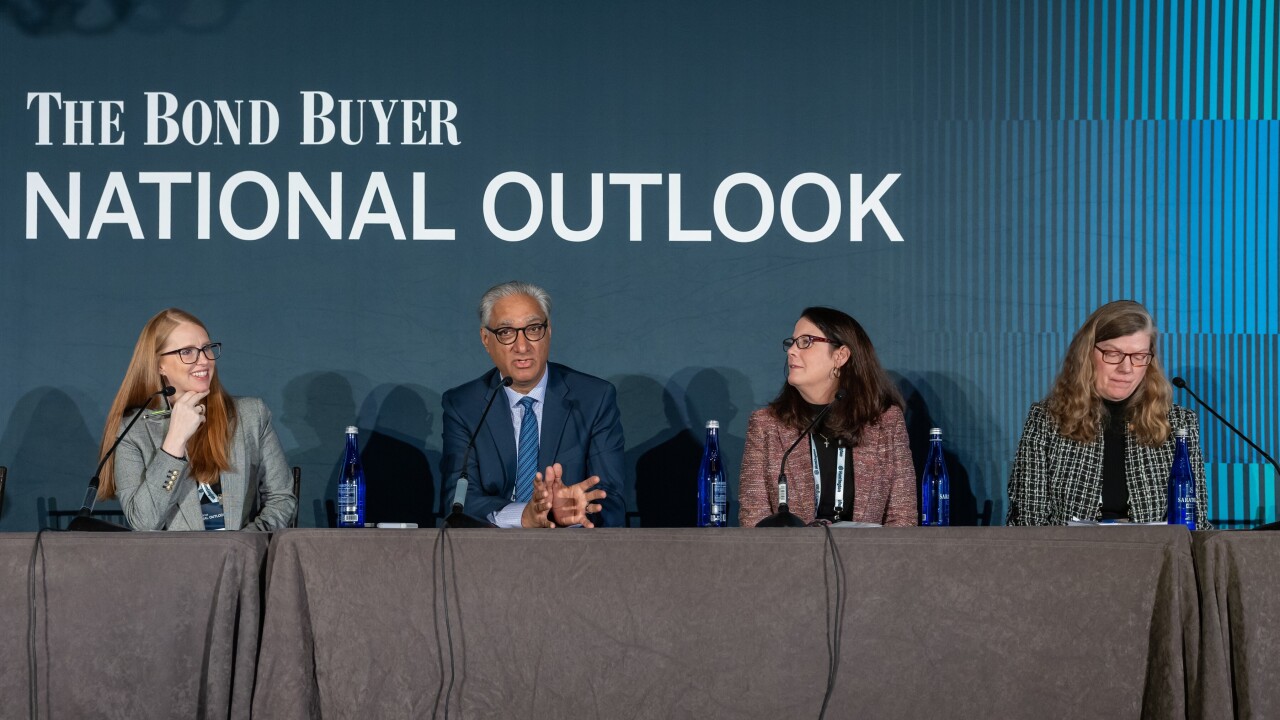Chicago Mayor Lori Lightfoot’s $1.3 billion debt refinancing — with Goldman Sachs, JPMorgan, Cabrera Capital Markets LLC, and Siebert Williams Shank & Co. LLC in the lead spots — is set for a City Council vote next week.
The council’s Finance Committee signed off on the bond authorization, along with a tax revenue package, on Tuesday. They are two crucial pieces of Lightfoot’s effort to wipe out a more than $800 million deficit in 2020. Approval came after council members questioned the reliability of some revenue sources used to fill the hole in an $11.65 billion budget.

The measures, along with a revised property tax levy, were deferred and published at the council’s Wednesday meeting and will be voted on as part of the budget package on Nov. 26. Lightfoot highlighted the budget plan’s reliance on more than 60% structural solutions to close the gap and lack of a large property and the time for negotiation is over.
“The budget is the budget is the budget,” Lightfoot said after the council meeting.
Lightfoot struck out during the state’s fall veto session in requests for changes to the tax structure for a Chicago-based casino to make it more attractive to an operator and to change the city’s tax on property sales. Both will be resurrected when lawmakers return in January.
A graduated transfer tax would generate $100 million annually, according to the Lightfoot administration, and a casino once up and running is projected to generate about $200 million in revenue annually that would be earmarked for public safety pensions. If the city fails, it must come up with replacements to meet a 2022 target for structural balance, a pledge made to rating agencies and Lightfoot has warned of a potential property tax hike.
Bond deal details
More than 50% of the underwriting team allocations will go to minority- and women-owned firms, one of the highest levels ever, chief financial officer Jennie Huang Bennett said.
The city is still working on details of the bond refinancing that include whether it will include taxable debt and how much would be sold under the city’s Sales Tax Securitization Corp. and how much under its GO credit, although Bennett has said more would be sold under the STSC structure.
Goldman Sachs and Cabrera Capital Markets are senior managers on the STSC bonds. RBC Capital Markets is co-senior manager and Loop Capital Markets, Rice Financial Products, and Melvin Securities LLC are co-managers.
PFM and Public Alternative Advisors LLC are advisors.
Nixon Peabody LLP and Sanchez Daniels & Hoffman are co-bond counsel. Ice Miller LLP and Zuber Lawler and Del Duca LLP are co-disclosure counsel. Chapman and Cutler LLP is special counsel to the city. STSC counsel is Mayer Brown LLP. McGuire Woods LLP is underwriters counsel.
Mayer Brown, which is a frequent member of city deal teams and served as STSC counsel on its previous four deals totaling $2.6 billion, reports on its economic statement that Lightfoot was a partner at the firm until her resignation in May 2018.
The “disclosing party has within the last 12 months, and expects that it will with the next 12 months, pay to Mayor Lightfoot the value of her partnership interest all of which was earned prior to her resignation from the Firm,” reads the disclosure.
JPMorgan and Siebert are seniors on the GO bonds. Stifel is the co-senior manager and Estrada Hinojosa, Harvestons Securities, and Bank of America Merrill Lunch are co-managers.
Columbia Capital Management LLC and Swap Financial Group are advisors. Katten Muchin Rosenman LLP and Reyes Kurson Ltd. are co-bond counsel. Thompson Coburn LLP and Golden Holly James are co-disclosure counsel. Chapman is special pension disclosure counsel. McGuire Woods LLP is underwriters counsel.
The ordinance authorizes up to $1.5 billion but Bennett said the plan remains to sell $1.2 billion to refund $1.3 billion of currently callable general obligation and motor fuel tax bonds.
The deal will also take out a small direct placement financing completed by the Chicago Infrastructure Trust for energy efficiency initiatives. The city is dissolving the trust established by former Mayor Rahm Emanuel in 2012.
Banking sources familiar with the deals said the current estimates are for as much as $600 million to sell under the GO credit with slightly more selling under the STSC credit, but numbers remain fluid. The STSC bonds would establish a new junior lien. The senior lien carries double-A and triple-A ratings. The GOs would be rated in the triple-BBB to single-A category.
“The city anticipates realizing 2020 savings of $210 million with the issuance of the bonds with reduced debt service both overall and in every future budget year,” Bennett told the finance committee. “These savings will be used to help close the $838 million budget gap for 2020.”
The bulk of the savings are being taken upfront. Bennett said the $210 million estimate is conservative and more could be achieved with the expectation of trading in average coupons of about 4.9% for rates in the range of 3 to 3.5%. The average life of the bonds being refunded is now 10.3 years and will be trimmed slightly to 10 years while one year will be trimmed off the current 2040 final maturity.
“Debt service in every year will be lower than the refunded debt service….this is not scoop and toss,” Bennett said in an interview after the meeting. Bennett continues to acknowledge that the upfront savings is a one-shot but argues that it gives the city breathing room to reach structural balance by a 2022 target.
The city also could issue a small amount under the senior lien credit “but there’s not a lot of capacity” on coverage ratios.
The city continues to target a pricing as soon as next month or early next year.
The city is in discussions with Fitch Ratings, Kroll Bond Rating Agency, and S&P Global Ratings and is not talking to Moody’s Investors Service about rating the bonds. Former Mayor Rahm Emanuel shunned Moody’s after the ratin agency stripped Chicago of an investment grade in May 2015.
Taxes and fees
While the bond deal sailed through committee with just one question over minority participation on the legal firms, aldermen spent several hours questioning pieces of the revenue package and raised concerns over whether the federal government will sign off on Medicaid-related ambulance fee hikes. Some aldermen also want Lightfoot to reconsider her ride-share tax increase, slated to bring in $40 million.
Alderman Raymond Lopez sought but lost an effort to strip the ride-share tax out of the package asking why the administration would “shut the door” on a proposal from Uber that it claims could generate $50 million annually.
The city will hear next week whether the federal government has signed off on the emergency services-related charge. It accounts for $133 million of the $160 million that is expected to come from hikes in ambulance-related services. The finance team said they would return with a backup revenue plan if the federal approval falls through.
The revenue package also includes a process for dissolving the Chicago Infrastructure Trust. Emanuel announced the trust alongside former President Bill Clinton in 2012 as a means to leverage private investment in infrastructure projects without tapping the city’s balance sheet.
While the trust had a list of innovative projects as goals, it struggled to attract affordable financing and often ended up serving as a manager for projects being traditionally financed. That was the case for an overhaul now underway of the city’s streetlamp system.
The city will take over assets and liabilities and conduct an audit. About $1.9 million of cash on hand will be transferred to the city and the finance team told aldermen that should cover any liabilities or contractual obligations.
While some aldermen said they were skeptical of the touted benefits of creating the trust, others said they believed it brought value to the city. “I don’t see the haste” in dissolving it now before an audit and full evaluation, said Alderman Jason Ervin.
Bennett said the city expects to generate some savings in its refinancing of the $13 million private placement trust deal that was included the $1.5 billion refunding authorization. Bank of America Public Capital Corp. entered into a 15-year loan with the trust at a rate of 4.95%. It funded energy upgrades to 60 city buildings.





